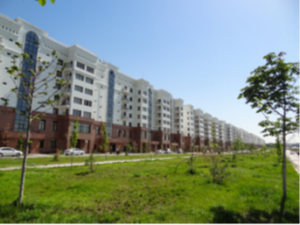Technological innovation

ㅤ
Stabilised Soil Blocks (SSB) in Darfur, Sudan
Since 2006 UN HABITAT has been working with various local and international partners in Darfur to develop stabilised soil block (SSB) building technology. Fired brick is the prevailing building technology but its production has contributed to water shortages and widespread deforestation (one third of the forests in Darfur were lost between 1973 and 2006). SSB construction consists of testing and preparing the soil, pressing the mix into a manually operated compressing machine, then removing the block and allowing it to cure. SSB have three principal advantages compared with fired brick:
- Economic: stabilised soil blocks are 30 per cent cheaper than traditional wood-fired blocks and building with them is faster.
- Social: Their production is labour intensive, which offers considerable opportunities for their large-scale production as micro-enterprise activity to boost local employment.
- Environmental: the blocks have a positive environmental impact through counteracting deforestation (no trees are required in their production) and reducing water usage (half that required for burnt bricks).
The experience in Darfur also demonstrates that training programmes are just as important as developing new building technology. Training of trainers has disseminated building skills in the major cities, towns and villages and so far more than 1,800 people have received training on the benefits and process of stabilised soil blocks. Pilot demonstration buildings have been built to demonstrate the capabilities and benefits of this new technology.
The SSB experience highlights the urgent need for housing policy in African countries to recognise that building materials are a fundamental input into affordable housing. Throughout Africa much more can be done to reduce the cost and increase accessibility of building materials whilst harnessing their ability to contribute to local economies and provide employment opportunities. Furthermore, increasing affordable housing supply must be achieved in a way that is environmentally sustainable and does not adversely affect local, international, and continent’s ecosystems and natural resources.
Industry training strategies to implement energy renovation in France

- Figure a: Typical Parisian urban area with apartment buildings. Photo credit: Guilhem Vellut (creative commons licence). Source: https://unece.org/sites/default/files/2021-10/Housing2030%20study_E_web.pdf
In France, the social housing sector requires a very large skilled labour force for the energy-efficient renovation of its homes. The sector has proposed to establish a dedicated Low-Carbon School for Social Housing. The Union of Social Housing Organizations (USH) already took steps in this direction in 2020 via a massive online open course on energy management. It proposed to extend this effort by establishing a low-carbon observatory for social housing, setting a national benchmark for energy efficiency in social housing operations and research on construction processes and materials to improve energy savings and low-carbon performance.
Capacity-building in professional housing management in Kazakhstan and Uzbekistan

- Figure b: Uzbekistan social housing buildings. Photo credit: Cecilia Batac, UNECE. Source: https://unece.org/sites/default/files/2021-10/Housing2030%20study_E_web.pdf
Efficient and qualified housing administration is a prerequisite for the modernization of the rapidly deteriorating housing stock in Central Asia. As a professional market for housing management has not been sufficiently developed, it is crucial to improve the legal conditions for housing management, to strengthen the role of qualified housing managers in the high-quality maintenance of residential buildings, and to support energy-efficient refurbishment. Within the professional housing project, training is offered by the Housing Initiative for Eastern European (Initiative Wohnungswirtschaft Osteuropa – IWO), the European Training Centre for the Housing and Real Estate Industry (EBZ) Germany, SHANYRAK association of management entities, services and energy service in housing sector Nur-Sultan, Kazakhstan, Association of the Organizations of Professionally Managing and Serving Housing Funds in Uzbekistan and the United Nations Development Programme (UNDP) in Kazakhstan. This training is given to enhance the professionalism and improve the organizational and institutional capacities of business intermediary organizations dealing with housing and energy efficiency issues.
More information:
- UN-Habitat’s Affordable Land and Housing in Africa Report. Source: UN-HABITAT, 2009: https://unhabitat.org/sites/default/files/download-manager-files/Affordable%20Land%20and%20Housing%20in%20Africa.pdf
- UNECE Housing 2030 Report. Source: https://unece.org/sites/default/files/2021-10/Housing2030%20study_E_web.pdf